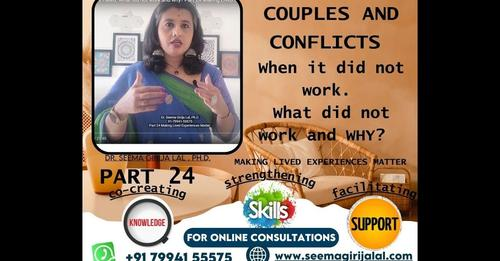Navigating Couple’s Consultation Challenges
June 10, 2024


When to Move from Combined to Individual Consultations: Navigating Couple's Consultation Challenges

This video sheds light on the intricacies of consultations and mental health. Today, we'll dive deep into the circumstances when combined sessions for couples may not be effective, and the situations where even individual consultations might hit roadblocks.
V.A.L.U.E. - Understanding Consultation Transitions
1. Vulnerability: Combined sessions falter when one partner seeks to end the relationship while the other is desperate to salvage it. Vulnerability is skewed, with one partner clear in their decision and the other fixated on changing their mind.
2. Agency: When sessions turn into a fault-finding mission rather than a journey of mutual understanding, agency is lost. Both partners need to own their roles in the relationship dynamics, rather than assigning blame.
3. Learning: Progress is impossible if both partners are stuck in a venting cycle without a willingness to learn from past behaviours. True growth requires an openness to understanding each other's patterns and childhood influences.
4. Unity: Consultation is ineffective if one partner refuses to acknowledge problems or views issues solely as the other's responsibility. Unity in purpose and effort is essential for joint sessions to succeed.
5. Empowerment: Empowerment comes from setting and working on tiny, achievable goals. When partners consistently fail to prioritize these goals, the consultative process stalls. Both need to be committed to self-improvement and non-violent communication.
• Different Goals: If partners have contrasting objectives (e.g., one wants out, the other wants to stay), combined sessions often fail.
• Blame Game: Sessions centered on blame and rigid perspectives hinder progress.
• Lack of Acceptance: One-sided problem acceptance prevents effective consultations.
• Venting without Progress: Constant venting without actionable steps leads to stagnation.
• External Pressures: Family or societal pressures can entangle partners, complicating consultations.
• Commitment to Self-Work: Both partners must be willing to work on themselves and understand their role in the relationship dynamics.
